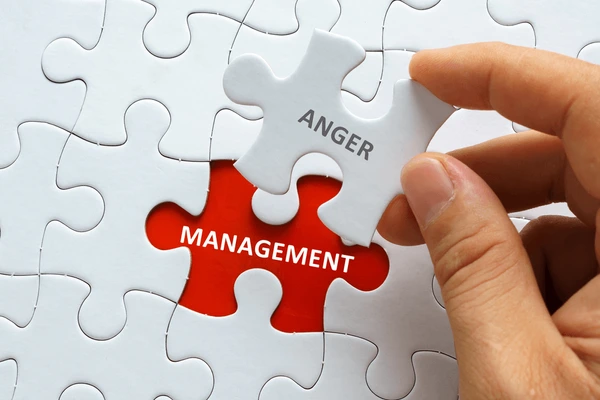-
129, Block-A Bangur Avenue, Mousumi Appartment, Kolkata 700055
129, Block-A Bangur Avenue, Mousumi Appartment, Kolkata 700055

Discover effective stress relief techniques at work that enhance focus, productivity, and emotional balance — insights from a reputed psychological counsellor to help you thrive in your professional life. Workplaces today are evolving faster than ever. Tight deadlines, constant communication, and high expectations have become a regular part of our professional lives. While challenges can motivate growth, unchecked pressure can lead to burnout, anxiety, and loss of productivity. Understanding Workplace Stress and Its ImpactThe Psychology Behind Stress at WorkThe Most Effective Stress Relief Techniques at Work1. Mindful Breathing and Grounding Exercises2. Time Management with Purpose3. Creating Healthy Workplace Boundaries4. The Power of Physical Movement5. Social Connection and Support6. Mindful Nutrition and Hydration7. Digital Detox During Work Hours8. Gratitude and Reflective JournalingWhy Professional Guidance MattersFAQsA Refreshing Perspective on Workplace Calm Learning effective stress relief techniques at work is not just about relaxation — it’s about creating a sustainable rhythm that protects mental wellbeing while enhancing performance. Let’s explore the science, strategies, and practical habits that can help you stay calm, centered, and emotionally strong throughout the workday. Understanding Workplace Stress and Its Impact Stress is a natural response that prepares the body for action. However, when it becomes chronic, it can harm both physical and mental health. Common signs of workplace stress include: Constant fatigue despite adequate sleep Irritability, mood swings, or loss of motivation Difficulty concentrating or making decisions Headaches, muscle tension, or digestive issues Withdrawal from coworkers or decreased performance Modern professionals often ignore these symptoms, mistaking them for “just part of the job.” But stress, when left unchecked, can reduce creativity, lower confidence, and damage relationships both inside and outside the office. Understanding and implementing stress relief techniques at work can transform how you respond to challenges — from reactive to mindful. The Psychology Behind Stress at Work From a psychological perspective, workplace stress often stems from: Lack of control over workload or outcomes Unclear expectations or inconsistent feedback Conflict with colleagues or management Job insecurity or fear of underperformance Perfectionism or excessive self-criticism When these stressors persist, they activate the body’s “fight or flight” response — increasing cortisol levels and reducing mental clarity. Over time, this can cause emotional exhaustion and a sense of detachment from work. The key lies not in avoiding challenges but in managing them mindfully. The Most Effective Stress Relief Techniques at Work 1. Mindful Breathing and Grounding Exercises Taking short breaks to...

Discover how family counselling strengthens relationships and fosters deeper understanding with guidance from a reputed Psychological Counselor. Learn how therapy nurtures communication, empathy, and long-term harmony within families. Families are the cornerstone of emotional security, love, and belonging. Yet, even the closest families face misunderstandings, conflicts, and emotional distance. In today’s fast-paced world, changing lifestyles and communication barriers often cause relationships to lose balance. This is where family counselling plays a transformative role—helping families rebuild trust, communication, and compassion. Understanding Family CounsellingWhy Modern Families Need CounsellingThe Role of a Professional Psychological CounselorHow Family Counselling Strengthens Emotional Bonds1. Encourages Honest Communication2. Rebuilds Trust3. Promotes Mutual Respect4. Teaches Emotional Regulation5. Supports Problem-Solving TogetherWhen Should Families Consider CounsellingBenefits of Family CounsellingThe Counselling Process – Step by StepThe Psychological Side of HealingCommon Myths About Family CounsellingFAQs About Family CounsellingA Thoughtful Reflection Let’s explore how family counselling strengthens relationships and why seeking professional help early can bring lasting peace to every home. Understanding Family Counselling Family counselling is a form of therapy that focuses on improving communication and resolving conflicts among family members. Unlike individual therapy, which centers on personal growth, family counselling views the family as a unit—where each member’s behavior affects the overall dynamic. Through guided sessions, a counselor helps family members express themselves safely, identify patterns of misunderstanding, and rebuild emotional connection. It’s not about assigning blame; it’s about healing together. Why Modern Families Need Counselling In the past, extended families and community ties offered natural support systems. But today, smaller households, work pressures, and digital distractions have created emotional gaps. Family counselling bridges those gaps by offering a structured environment for dialogue and emotional understanding. Here’s why it’s becoming essential: Improves communication: Encourages healthy discussion and expression. Reduces stress: Helps manage emotional triggers and family tension. Strengthens empathy: Promotes understanding between parents and children. Resolves conflicts: Provides tools for fair and peaceful conflict resolution. Encourages emotional awareness: Helps individuals identify and regulate their emotions. When families learn to talk, listen, and support each other without judgment, the foundation of love and trust becomes stronger. The Role of a Professional Psychological Counselor Family counselling becomes truly effective when guided by an experienced professional who understands both the emotional and psychological layers of family dynamics. A skilled counselor uses proven therapeutic techniques to: Identify recurring behavioral patterns. Mediate difficult conversations. Teach coping strategies for anger, resentment, or guilt. Guide families in setting healthy...

Manage Daily Stress with proven psychological methods and learn how counseling experts guide people toward calmness, balance, and emotional strength through science-backed approaches. Manage daily stress with tips from the Best Psychological Counselor in Kolkata. Stay calm, focused, and emotionally strong every day. In today’s fast-paced world, stress feels almost unavoidable. Deadlines, responsibilities, and constant connectivity make our minds restless. However, while stress is a natural human response, chronic stress and anxiety can damage both mental and physical health if not managed properly. Learning to Manage Daily Stress effectively is not just about relaxation—it’s about building resilience, emotional awareness, and mental flexibility. Understanding the Psychology of StressWhy Modern Life Fuels Daily StressThe Science-Backed Ways to Manage Daily Stress1. Practice Mindful Breathing2. Establish a Grounding Morning Routine3. Manage Digital Exposure4. Cognitive Restructuring5. Move Your Body Regularly6. Set Healthy Emotional Boundaries7. Practice Gratitude and Journaling8. Reconnect with Nature9. Use Professional Counselling SupportHow Professional Support Makes a DifferenceLifestyle Adjustments to Manage Daily Stress Long-TermEmotional Intelligence and Stress ControlWhen to Seek Professional HelpFAQs on Managing Daily StressA Calmer Tomorrow Begins with Awareness This guide explores expert-backed strategies to manage daily stress, the psychology behind it, and how professional counselling can help individuals restore calm and focus. Understanding the Psychology of Stress Before diving into techniques, it’s essential to understand what stress really is. Stress is your body’s reaction to any kind of demand or challenge. Short-term stress can sharpen your focus and alertness, but prolonged stress releases high levels of cortisol—the “stress hormone”—which can harm your mind and body. Common effects of chronic stress include: Persistent fatigue or lack of motivation Irritability and mood swings Headaches, muscle tension, and insomnia Reduced concentration and memory issues Heightened anxiety or feelings of hopelessness Understanding these signs helps you recognize when your stress levels are moving beyond what’s manageable. Why Modern Life Fuels Daily Stress Several lifestyle factors today contribute to our rising stress levels: Information Overload: Constant exposure to digital content and social media comparisons. Work Pressure: High expectations, tight deadlines, and multitasking burnout. Lack of Boundaries: Difficulty separating personal and professional life. Unhealthy Habits: Poor diet, irregular sleep, and minimal physical activity. Emotional Isolation: Less face-to-face connection, more virtual communication. Recognizing these triggers is the first step toward creating a mindful, balanced lifestyle. The Science-Backed Ways to Manage Daily Stress There’s no universal formula to eliminate stress, but evidence-based methods can help you regain control...

Learn how to manage anger effectively with counselling techniques and guidance from a reputed psychological counselor for long-term emotional balance. Understanding Anger as an EmotionWhy Does Anger Become Hard to Manage?How Counselling Helps Manage Anger1. Identifying Triggers2. Reshaping Thought Patterns3. Emotional Regulation Skills4. Building Communication Skills5. Developing Long-Term Coping StrategiesPractical Tips to Apply Alongside CounsellingWhy Counselling is Effective for Anger ManagementWhen Should You Seek Counselling for Anger?FAQs on Anger ManagementA Perspective Worth Holding On To Understanding Anger as an Emotion Anger is one of the most common yet misunderstood human emotions. It often arises when we feel threatened, treated unfairly, or unable to control a situation. While many see it as purely negative, anger itself isn’t the problem — it’s a signal. Just like pain tells us something is wrong in the body, anger signals emotional discomfort or unmet needs. For example: A student frustrated over repeated failures might feel angry not at the subject but at the sense of helplessness. A parent snapping at their child may actually be expressing hidden stress from work. A person stuck in traffic may feel angry not at other drivers but at the loss of time and control. The key lies in learning to understand and manage anger, rather than letting it take control of us. Why Does Anger Become Hard to Manage? Uncontrolled anger doesn’t just harm relationships — it affects the body and mind. But why does it spiral out of control for some people? Stress overload: Constant pressure from work, studies, or finances keeps the mind in fight-or-flight mode. Unprocessed emotions: Sadness, fear, or disappointment that’s never expressed often erupts as anger. Biological triggers: Sleep deprivation, hormonal shifts, or even low blood sugar can make people more irritable. Past experiences: Growing up in environments where anger was common can normalize unhealthy reactions. Cognitive distortions: Thinking in extremes (“always,” “never”) fuels frustration. Research shows that chronic anger increases risks of high blood pressure, heart disease, and even weakened immunity — proving it’s not “just an emotion” but a health concern too. How Counselling Helps Manage Anger When wondering how to manage anger, many try self-help techniques like exercise, meditation, or journaling. While these work, counselling goes deeper by addressing the root causes and providing personalized strategies. 1. Identifying Triggers Counsellors help individuals map out patterns — what situations, people, or thoughts spark anger. This awareness builds a foundation for healthier responses....

Learn how to recognise burnout early and protect your mental health with insights from a reputed psychological counselor. Understanding Burnout in Today’s Fast-Paced WorldWhat Does Burnout Really Look Like?Common signs to watch out for:Why Recognising Burnout MattersStages of Burnout You Should KnowHow to Recognise Burnout in Your Daily LifeEmotional IndicatorsPhysical IndicatorsBehavioral IndicatorsPractical Ways to Prevent BurnoutHealthy Work HabitsSelf-Care PracticesBuilding Emotional ResilienceWhen Should You Seek Professional Help?FAQs on BurnoutFinding Balance Before It’s Too Late Understanding Burnout in Today’s Fast-Paced World The pressure to keep up with deadlines, family responsibilities, and personal ambitions often leaves people running on empty. Burnout isn’t just about being tired—it’s a state of emotional, physical, and mental exhaustion caused by prolonged stress. The earlier you recognise burnout, the easier it is to take steps to prevent it from damaging your health and relationships. What Does Burnout Really Look Like? Burnout can be tricky to identify because it doesn’t happen overnight. It creeps in slowly, often masked as normal stress. Recognising the early warning signs can save you from hitting a breaking point. Common signs to watch out for: Persistent fatigue even after rest Difficulty concentrating or making decisions Irritability and mood swings Feeling detached or numb towards work and relationships Frequent headaches or stomach issues Why Recognising Burnout Matters Ignoring the symptoms can lead to serious mental health issues like depression and anxiety, as well as physical problems such as high blood pressure and heart disease. By learning to recognise burnout early, you can restore balance before stress takes control of your life. Stages of Burnout You Should Know Burnout often develops in stages. Understanding these stages makes it easier to catch yourself before reaching the most severe point. The Honeymoon Phase – You feel driven, motivated, and ready to take on challenges. Onset of Stress – Small signs like forgetfulness and fatigue start to appear. Chronic Stress – Sleep problems, irritability, and withdrawal from social life become noticeable. Burnout – Complete exhaustion, lack of motivation, and health decline. Habitual Burnout – Burnout becomes part of your life, deeply impacting both mind and body. How to Recognise Burnout in Your Daily Life Sometimes, recognising burnout is about noticing subtle shifts in your habits and emotions. Emotional Indicators Feeling unmotivated about tasks you once enjoyed Increased cynicism or negative thinking Emotional outbursts over small issues Physical Indicators Frequent illnesses due to weakened immunity Drained energy levels Disrupted sleep...

Learn why mental health breaks improve productivity and how insights from the Best psychological counselor in Kolkata highlight the importance of mindful pauses at work. Understanding the Link Between Mental Health and ProductivityWhy Mental Health Breaks Improve ProductivityThe Science Behind Taking BreaksSigns You May Need a Mental Health BreakTypes of Mental Health Breaks That Boost ProductivityHow Mental Health Breaks Improve Team ProductivityIntegrating Mental Health Breaks Into Daily LifeLong-Term Benefits of Mental Health BreaksFAQs on Mental Health BreaksFinal Thoughts on Mental Health Breaks Understanding the Link Between Mental Health and Productivity In today’s fast-paced world, productivity is often measured by how much you can accomplish in the shortest time possible. However, our minds aren’t machines. When overloaded, they respond with stress, fatigue, and burnout. This is where mental health breaks step in—not as interruptions, but as essential tools that refuel the brain and improve efficiency. Why Mental Health Breaks Improve Productivity Short, intentional breaks are scientifically proven to enhance focus, creativity, and emotional stability. Think of them as a reset button for your brain. By stepping away from constant tasks, you give your mind the space it needs to process information, recharge energy, and return stronger. The Science Behind Taking Breaks Studies in neuroscience show that the brain works in cycles of intense focus followed by natural dips in attention. Without rest, stress hormones rise, memory weakens, and problem-solving ability declines. Mental health breaks reduce this cognitive load, allowing you to: Restore attention span Lower stress levels Improve emotional resilience Strengthen decision-making skills Signs You May Need a Mental Health Break If you’re wondering whether it’s time to step back, watch for these signals: Feeling mentally or physically exhausted Trouble concentrating or making small mistakes Irritability or mood swings Headaches or body tension Reduced motivation or creativity Types of Mental Health Breaks That Boost Productivity Not all breaks look the same. The key is to choose one that suits your needs: Micro-breaks – Just 1–2 minutes of stretching, breathing, or stepping away from your desk. Short breaks – A 10–15 minute walk, quick snack, or chat with a friend. Extended breaks – Taking a lunch away from screens or engaging in a hobby. Mental resets – Meditation, journaling, or listening to calming music. Digital detox – Turning off notifications for an hour to regain focus. How Mental Health Breaks Improve Team Productivity When workplaces encourage breaks, employees not only work better...